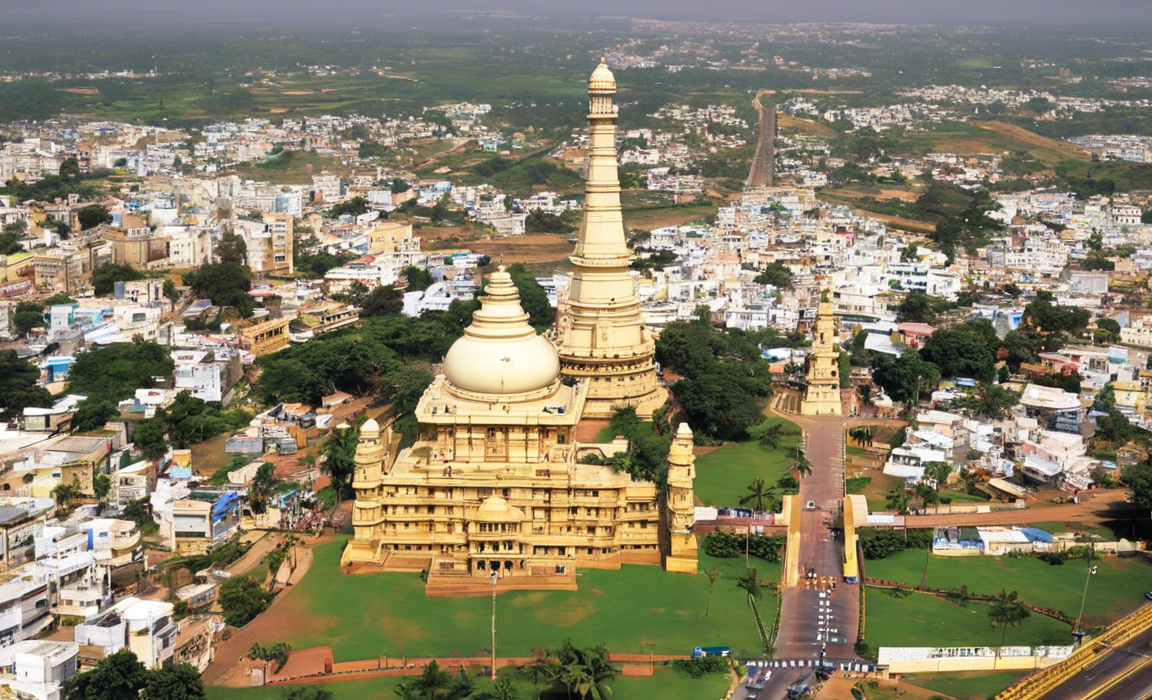Introduction
Amaravati, the planned capital city of the state of Andhra Pradesh in India, holds significant historical, cultural, and political importance. The city is located on the southern banks of the Krishna River and is known for its rich heritage, architectural marvels, and rapid development. Let’s delve deep into the diverse aspects of this vibrant city.
Historical Significance
Amaravati has a rich historical heritage dating back to the 3rd century BCE when it was known as Dharanikota. The city became a center of Buddhism during the rule of the Satavahanas and the region is well-known for the Amaravati Stupa, one of the oldest and most significant stupas in India. The stupa, dating back to the 2nd century BCE, is adorned with intricate carvings that depict various Buddhist themes and narratives.
Cultural Attractions
The city of Amaravati is a treasure trove of cultural attractions. The Amaravati Museum, located near the stupa, houses a remarkable collection of artifacts, sculptures, and inscriptions that offer insights into the rich history of the region. The Amareswara Temple dedicated to Lord Shiva is another iconic landmark in the city and attracts devotees and tourists alike.
Architectural Marvels
Amaravati boasts of impressive architectural marvels that showcase the ingenuity of ancient builders and craftsmen. The Undavalli Caves, located near the city, are rock-cut caves adorned with intricate sculptures and carvings dating back to the 4th-5th centuries. The Kondapalli Fort, situated on a hill overlooking the city, is another architectural gem that provides panoramic views of the surrounding landscape.
Modern Development
In recent years, Amaravati has witnessed rapid development and growth as it transitions into a modern and sustainable capital city. The Andhra Pradesh government has undertaken ambitious infrastructure projects, including the construction of government buildings, residential complexes, and commercial establishments. The city is designed to be a hub of economic activity, administrative functions, and cultural exchange.
Tourist Destinations
Apart from its historical and cultural attractions, Amaravati offers a range of tourist destinations to explore. The Bhavani Island, situated on the Krishna River, is a popular leisure spot known for its scenic beauty and water sports activities. The Undavalli Caves and the nearby Mangalagiri Hill are ideal for a day trip to admire ancient architecture and natural beauty.
Education and Research Institutes
Amaravati is emerging as an educational hub with the presence of premier institutes and universities. The SRM University, VIT Amaravati, and the Indian Institute of Technology (IIT) are some of the prominent institutions that offer quality education in various fields. The city is poised to become a center of excellence in academia and research.
Cuisine and Local Delicacies
A visit to Amaravati is incomplete without savoring the local cuisine and delicacies. The region is renowned for its delectable dishes infused with flavors and spices. Some must-try delicacies include Pesarattu (green gram dosa), Gongura Pachadi (sorrel leaves chutney), and Ulavacharu (horse gram stew). The city is a paradise for food enthusiasts seeking authentic South Indian flavors.
Conclusion
Amaravati, the capital city of Andhra Pradesh, is a unique blend of historical heritage, cultural vibrancy, and modern development. From ancient stupas and architectural marvels to educational institutes and culinary delights, the city offers a myriad of experiences for visitors. Exploring Amaravati is a journey through time and tradition, unveiling the rich tapestry of its past and the promising future that lies ahead.
Frequently Asked Questions (FAQs)
- What is the best time to visit Amaravati?
-
The best time to visit Amaravati is during the winter months from October to March when the weather is pleasant and conducive for sightseeing.
-
How can I reach Amaravati?
-
Amaravati is well-connected by road, rail, and air. The nearest airport is in Vijayawada, approximately 30 kilometers away, and the city has a railway station that connects it to major cities.
-
What are the must-visit places in Amaravati?
-
Some of the must-visit places in Amaravati include the Amaravati Stupa, Amaravati Museum, Amareswara Temple, Undavalli Caves, and Bhavani Island.
-
Is there accommodation available in Amaravati for tourists?
-
Yes, Amaravati offers a range of accommodation options to suit every budget, including luxury hotels, budget guesthouses, and homestays.
-
Are there any shopping options in Amaravati?
-
Visitors can explore local markets and shopping centers in Amaravati to buy traditional handicrafts, handlooms, spices, and souvenirs.
-
What are the notable festivals celebrated in Amaravati?
-
Amaravati celebrates various festivals with great fervor, including Ugadi, Dussehra, Makar Sankranti, and Diwali. The city comes alive with cultural performances, rituals, and festivities during these occasions.
-
Is it safe for solo travelers to visit Amaravati?
-
Amaravati is generally safe for solo travelers, but it is advisable to take necessary precautions and adhere to local customs and regulations while exploring the city.
-
Can I hire a guide for a tour of Amaravati’s historical sites?
-
Yes, tourists can hire professional guides at the Amaravati Stupa and other historical sites to learn about the significance and history of these landmarks.
-
What are the transportation options available within Amaravati?
-
Visitors can use local buses, auto-rickshaws, taxis, and car rentals to commute within Amaravati and explore its various attractions.
-
Are there any eco-friendly initiatives in Amaravati?
- The government of Andhra Pradesh is focusing on sustainable and eco-friendly development in Amaravati, including green spaces, renewable energy projects, and waste management initiatives.

